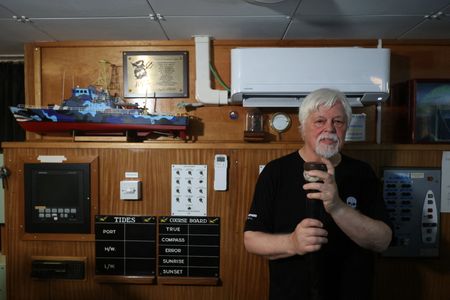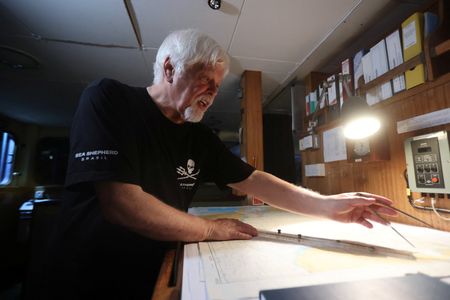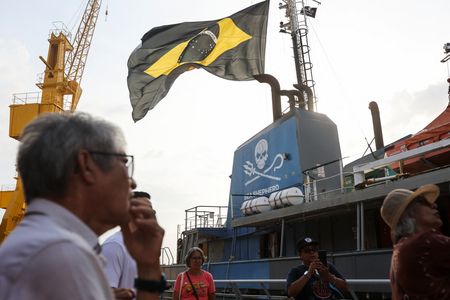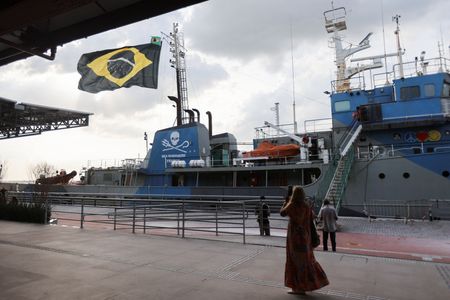By Lisandra Paraguassu
BELEM, Brazil, (Reuters) -A Canadian anti-whaling activist who has dodged arrest in Japan for more than a decade vowed at COP30 in Brazil to continue fighting for marine protection – taking aim in particular at deep-sea mining and Norway’s krill industry.
Paul Watson urged delegates this week at the U.N. climate summit in the Amazon city of Belem to look beyond the world’s forests and remember that oceans also help to limit climate change, with phytoplankton producing much of the oxygen that we breathe.
These photosynthetic organisms along with many ocean creatures are under threat, as climate change warms ocean temperatures and melts polar sea ice.
“If phytoplankton were to disappear from the sea, we would die,” Watson told Reuters in an interview aboard his boat, the John Paul Dejoria. “But it tends to be out of sight, out of mind. You can see the rainforest; you can’t see the phytoplankton.”
An influential early member of Greenpeace in the 1970s, Watson launched Sea Shepherd to focus on ocean protection. The activist group grabbed international attention for chasing trawlers and whaling ships across the high seas, and other antics designed to disrupt ocean prospecting.
Watson cheered the end of Japan’s whaling in international waters in 2019, after the International Court of Justice decided the hunt in the Southern Ocean was illegal. He set up the Captain Paul Watson Foundation in 2022.
Now, he said he is turning his attention to protecting smaller creatures – specifically the tiny krill that are the main source of food for some types of whales.
When the world’s High Seas Treaty comes into effect in January, Watson plans to challenge Norway’s harvesting of ocean krill to feed its salmon farms.
“We want to confront the Norwegian krill fishery on that day,” he said. “They’re taking 620,000 metric tons of krill out of the Southern Ocean, right out of the mouths of the whales and the penguins.”
He also aims to challenge attempts to mine rare earth minerals from the sea bed – a process scientists have warned could tear up ecosystems about which little is known.
U.S. President Donald Trump has ordered the country’s deep-sea mining efforts to accelerate.
When Watson arrived in Belem two weeks ago, Japan sent a request to Brazil for his arrest to face Japanese trespassing charges related to the alleged damage of a whaling boat and injury to a whaler.
Watson is not worried. In the last few days, he has attended numerous public events with Brazilian officials including Environment Minister Marina Silva and First Lady Rosangela da Silva.
A Brazilian government source told Reuters they would not be going after Watson.
“Japan follows me everywhere. And everywhere I go, they try to get me arrested,” he said of his 14 years dodging Japanese authorities. In July, Interpol dismissed a 2012 international arrest warrant for Watson, who has denied the Japanese charges.
(Reporting by Lisandra Paraguassu and Lais Morais in Belem, Brazil; additional reporting by Anderson Coelho; Editing by Katy Daigle and Nia Williams)















